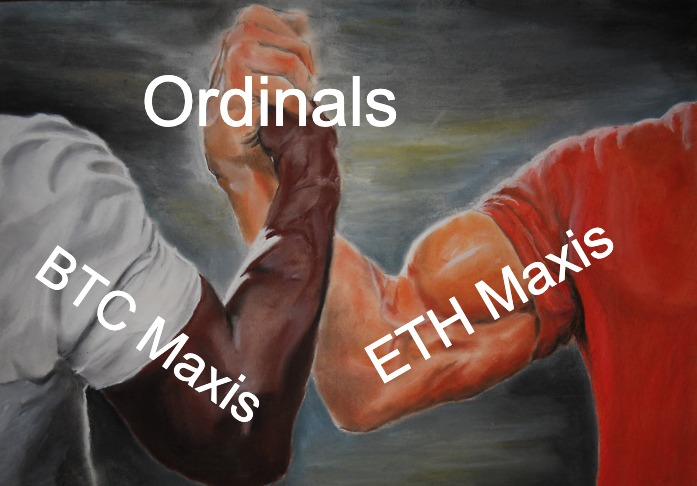
Representing real-world property on the Bitcoin blockchain is nothing new.
Over a decade in the past, tasks just like the Coloured Coin protocol and Counterparty alternate proved Bitcoin might monitor gadgets, not simply items of forex, in a decentralized approach.
Nevertheless, consensus points prevented both challenge from gaining widespread adoption available in the market. Ethereum shortly took over because the go-to platform for minting and deploying distinctive digital artifacts. This choice led to the rise of non-fungible tokens, or NFTs as they’re extra generally identified immediately.
However, issues seem to have come full circle as one Bitcoin developer seems to be to reinvent tokenized property on the Bitcoin blockchain. Even the Ethereum neighborhood appears to be encouraging this new enterprise. The transfer suggests a possible unity between what many see as two of the cryptocurrency business’s longest-standing rivals.

What are Bitcoin Ordinals?
Bitcoin Ordinals use an open-source protocol that assigns distinctive identities to particular person satoshis (sats). Named after Bitcoin’s creator(s), Satoshi Nakamoto, satoshis are the smallest items of bitcoin. Utilizing the Ord software program, the protocol provides information to those sats and permits software program customers to trace them based mostly on a system known as ordinal numbers.
At a excessive degree, this includes assigning a numerical worth to every satoshi based mostly on a number of elements. These elements embrace the time when that satoshi entered into circulation by way of mining in addition to the particular block height the place the satoshi seems.
Customers can use software program known as Ord to trace every satoshi. The system additionally inscribes them with content material to create bitcoin-native digital artifacts.
Customers can commerce and switch these uniquely-identified satoshis similar to any regular bitcoin unit. However not like Coloured Cash or most Ethereum NFTs, the digital merchandise itself is saved solely on-chain — not elsewhere on the web.
This performance wouldn’t be doable on Bitcoin with out implementing SegWit and Taproot — two gentle fork upgrades that helped to extend Bitcoin’s block capability.
Who created Bitcoin Ordinals?
Bitcoin developer Casey Rodarmor launched the Ordinal protocol on January 21, 2023. Rodarmor got down to create a system for numbering satoshis that might give every a novel serial quantity. This distinctive identifier would then permit customers to trace every satoshi throughout the blockchain. He needed to have the ability to accomplish this in a approach that was solely Bitcoin native, with out utilizing sidechains or separate tokens.
Rodarmor earned a level in Pc Science from College of California, Berkeley. Most not too long ago he labored as a software program engineer for Agora, an open-source app that improves upon the Bitcoin Lightning Network.
Rodarmor’s concept isn’t the primary time a numbering system has been proposed to assign distinctive identifiers to particular person satoshis. In actual fact, a BitcoinTalk consumer by the identify of jl2012 published an almost identical proposal for Ordinals in October 2012. On the time, one other Bitcoin developer discredited the publish as an “previous concept.”
Rodarmor has since acknowledged jl2012’s work within the final part of a mailing record publish saying Ordinals.
How do Ordinals work?
The Ordinal protocol consists of two fundamental elements:
- Ordinal idea: The strategy of numbering satoshis for monitoring, switch, and worth assigning functions.
- Inscription: The method of utilizing the Ord software program to affiliate content material with a satoshi based mostly on the quantity the software program assigns. The Ord software program associates content material with actual satoshis, however does so in response to a numbering scheme distinctive to the Ord software program.
Ordinal idea
Ordinals provide a way for assigning a novel identifier worth to every of the two.1 quadrillion satoshis that may ever be created.
The numerical worth assigned to every satoshi acts as a serial quantity. The system creates this serial quantity based mostly on how that satoshi pertains to completely different periodic occasions that occur on the Bitcoin blockchain, together with:
- Blocks: Batches of transactions which are dedicated to the Bitcoin blockchain roughly each 10 minutes. Blocks are the most typical occasion Ordinals use to derive their numerical worth.
- Problem adjustment intervals: After each 2,016 blocks (roughly each two weeks), the Bitcoin protocol adjusts its mining issue goal based mostly on the quantity of computational energy getting used to keep up the community. We name this the hashrate.
- Halvings epochs: After each 210,000 blocks (roughly each 4 years), the system halves the quantity of recent bitcoin getting into circulation. There have been three halvings for the reason that launch of Bitcoin.
- Cycles: After each six halvings, an issue adjustment and halving happen concurrently, leading to an occasion often called a conjunction. As a result of halvings solely happen each 4 years, conjunctions solely happen each 24 years. Conjunctions are the least frequent occasion that Ordinals monitor, and the time-frame between conjunctions is named a cycle.
Ordinals use these occasions to create a course of for monitoring the comparative rarity of satoshis. The Ordinal Theory Handbook breaks down how satoshis relate to every of those occasions utilizing the next rarity ranges:
| Rarity degree | Situation | Quantity (in complete BTC provide) |
| Widespread | Any sat that isn’t the primary sat of its block | 2,099,999,990,756,525 |
| Unusual | The primary sat of every block | 6,929,999 |
| Uncommon | The primary sat of every issue adjustment interval | 3,437 |
| Epic | The primary sat of every halving epoch | 32 |
| Legendary | The primary sat of every cycle | 5 |
| Mythic | The very first sat of the genesis block | 1 |
By assigning a novel identifier to every satoshi, Ordinals open a approach of creating inherently fungible satoshis into non-fungible objects. This identifier makes them utterly distinctive, similar to NFTs.
Ordinal inscription
We discuss with the committing of a bit of content material to a satoshi as “inscription.” This course of is completed utilizing Ord, and you’ll see inscriptions with the ordinals explorer.
The system identifies the content material by its MIME kind (whether or not it’s a JPEG, an MP3 file, HTML code, and many others) and a byte string (the content material itself). Inscriptions don’t essentially must characterize a non-fungible token. Customers also can create Bitcoin-based safety tokens and different property.
Ordinal inscriptions are solely on-chain and saved throughout the script of a taproot transaction. This course of is completely different from lots of the most prevalent NFT collections on the Ethereum blockchain. Normally, the Ethereum blockchain shops NFT media content material off-chain, whereas holding solely a report of the NFT on the blockchain.
Solely a choose few NFT collections, probably the most outstanding of that are CryptoPunks, retailer each the media and the NFT immediately on-chain.
Via this inscription course of, the blockchain shops content material alongside a particular satoshi. The method turns the satoshi into a novel digital artifact that customers can monitor, switch, maintain, purchase, and promote.
How Bitcoin Ordinals (might) impression Ethereum NFTs
The Ordinals protocol has resurrected the huge potential of tokenizing property on Bitcoin’s extremely safe, decentralized blockchain. Not solely that, it additionally serves as a method of completely storing digital content material immediately on-chain — one thing not often seen within the NFT area.
This innovation has already spurred the curiosity of present Ethereum-based NFT creators, together with Tom W, a co-founder of Cool Cats. On the official Ordinals Discord server, they commented, “Hey all, Im Tom, one of many co-founders of Cool Cats NFT. Right here to experiment with some cool shit. https://twitter.com/coolcats.”
With renewed capabilities for launching present standard collections on the Bitcoin blockchain, Ordinals might assist to fight the long-standing downside of misplaced NFTs. These stop exterior file storage points and will open up potential new income streams for NFT creators.
Apparently, Ordinals are literally gaining traction. For instance, Bitcoin Rocks from the Ethereum-based unique assortment have already sold for 0.2 BTC, whereas a blue check-verified Twitter consumer with the deal with “businessman.eth” posted, “WOW!!! 0.42 BTC sale for an @OrdinalPunks #Bitcoin Ordinals are beginning to acquire steam.”
Whereas the true impression of Ordinals remains to be rising, one factor is obvious: maximalists from each Bitcoin and Ethereum camps are excited in regards to the new alternatives these digital artifacts current.
Observe blog.kraken.com and our Twitter account @KrakenFX for all the most recent developments shaping the crypto business.
Wish to see an Ordinal for your self?
Click here to see one of the latest Ordinals to be inscribed, brought to you by Kraken.
These supplies are for normal data functions solely and will not be funding recommendation or a advice or solicitation to purchase, promote, or maintain any digital asset or to interact in any particular buying and selling technique. Some crypto merchandise and markets are unregulated, and also you might not be protected by authorities compensation and/or regulatory safety schemes. The unpredictable nature of the cryptoasset markets can result in lack of funds. Tax could also be payable on any return and/or on any improve within the worth of your crypto property and it’s best to search impartial recommendation in your taxation place.




More NFT News
Lawyer sues US homeland dept to probe supposed Satoshi Nakamoto assembly
Is a 40% Crash Subsequent?
Finest Altcoins to Purchase in 2025 and Spend money on Them